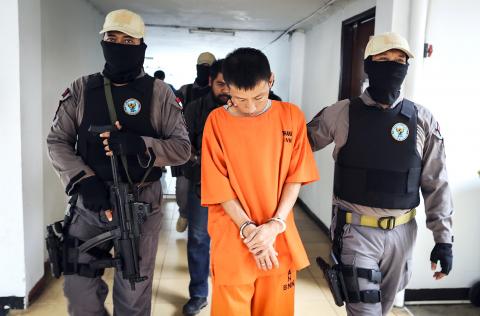Cambodia’s decision to deport several Taiwanese telecom fraud suspects to China yesterday drew condemnation from the Ministry of Foreign Affairs and the Mainland Affairs Council, as China continues to flout the terms of the Cross-Strait Joint Crime-Fighting and Judicial Mutual Assistance Agreement (海峽兩岸共同打擊犯罪及司法互助協議).
“Forced by Chinese pressure and based on its ‘one China’ policy, Cambodia acceded to mainland demands that the suspects be forcibly deported to the Chinese mainland and did not even agree to our side visiting them,” the ministry said in a statement.
Seven Taiwanese were arrested as part of a roundup of telecom fraud suspects by the Cambodian immigration authorities on July 17, the ministry said, adding that Cambodia had ignored its calls for the Taiwanese to be repatriated for trial under the nationality principle of jurisdiction.

Photo: EPA
Three Taiwanese remained in Cambodian custody and the nation’s representative office in Ho Chi Minh City, Vietnam, would continue to press for their repatriation to Taiwan, ministry spokeswoman Eleanor Wang (王珮玲) said.
The council said it had contacted China through established channels to demand that investigation and review of the cases be handled in Taiwan.
China’s refusal to respond to multiple demands for each side of the Taiwan Strait to handle cases involving their own nationals would hurt the healthy development of cross-strait relations, it said.
The council said it had demanded that the suspects be treated in accordance with the terms of existing agreements, including providing notification of their personal safety and allowing family visitations.
The council called on China to abandon its preconceptions and push aside unnecessary political obstacles so both sides could discuss appropriate responses and move forward on the foundation of existing cooperation.
In other news, a Taiwanese man was yesterday shot dead and two other suspects were arrested in Jakarta by Indonesian police, who raided an alleged international ring suspected of smuggling drugs into the country, Indonesian authorities said.
Customs and narcotics officers found 300kg of amphetamines stashed at the suspects’ home in Muara Karang, a residential complex, authorities said.
The man, identified as Khe Huan-hong, was shot dead during the raid after he tried to resist arrest and attacked police, authorities said.
Additional reporting by CNA

The manufacture of the remaining 28 M1A2T Abrams tanks Taiwan purchased from the US has recently been completed, and they are expected to be delivered within the next one to two months, a source said yesterday. The Ministry of National Defense is arranging cargo ships to transport the tanks to Taiwan as soon as possible, said the source, who is familiar with the matter. The estimated arrival time ranges from late this month to early next month, the source said. The 28 Abrams tanks make up the third and final batch of a total of 108 tanks, valued at about NT$40.5 billion

Travel agencies in Taiwan are working to secure alternative flights for travelers bound for New Zealand for the Lunar New Year holiday, as Air New Zealand workers are set to strike next week. The airline said that it has confirmed that the planned industrial action by its international wide-body cabin crew would go ahead on Thursday and Friday next week. While the Auckland-based carrier pledged to take reasonable measures to mitigate the impact of the workers’ strike, an Air New Zealand flight arriving at Taipei from Auckland on Thursday and another flight departing from Taipei for Auckland on Saturday would have to

A group from the Taiwanese Designers in Australia association yesterday represented Taiwan at the Midsumma Pride March in Melbourne. The march, held in the St. Kilda suburb, is the city’s largest LGBTQIA+ parade and the flagship event of the annual Midsumma Festival. It attracted more than 45,000 spectators who supported the 400 groups and 10,000 marchers that participated this year, the association said. Taiwanese Designers said they organized a team to march for Taiwan this year, joining politicians, government agencies, professionals and community organizations in showing support for LGBTQIA+ people and diverse communities. As the first country in Asia to legalize same-sex

MOTIVES QUESTIONED The PLA considers Xi’s policies toward Taiwan to be driven by personal considerations rather than military assessment, the Epoch Times reports Chinese President Xi Jinping’s (習近平) latest purge of the Chinese People’s Liberation Army (PLA) leadership might have been prompted by the military’s opposition to plans of invading Taiwan, the Epoch Times said. The Chinese military opposes waging war against Taiwan by a large consensus, putting it at odds with Xi’s vision, the Falun Gong-affiliated daily said in a report on Thursday, citing anonymous sources with insight into the PLA’s inner workings. The opposition is not the opinion of a few generals, but a widely shared view among the PLA cadre, the Epoch Times cited them as saying. “Chinese forces know full well that